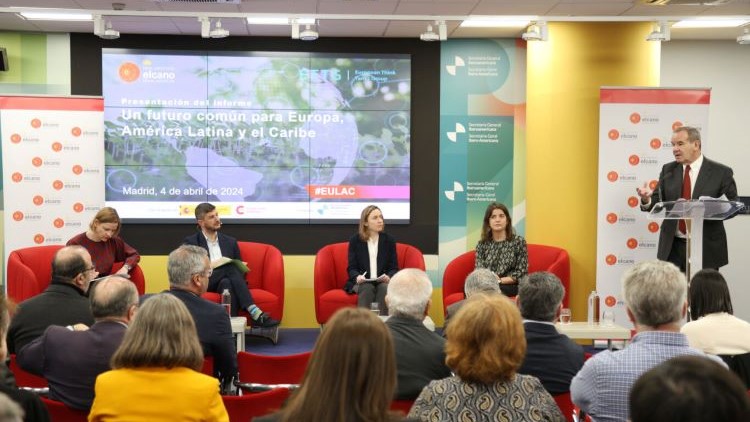Eduardo González
The shared interest in issues such as the ecological, digital and social transition and the “considerable financial needs” of Latin America and the Caribbean make it “necessary to strengthen financial relations” between this region and the European Union with an approach that goes “beyond aid”.
These are some of the conclusions of the report ‘A common future for Europe, Latin America and the Caribbean’, prepared by the Elcano Royal Institute, the Ibero-American General Secretariat (SEGIB) and the European Think Tanks Group (ETTG) with the support of the Ministry of Foreign Affairs and which was presented on thursday at the SEGIB headquarters in Madrid.
During the presentation, the Ibero-American Secretary General, Andrés Allamand, highlighted the importance of cooperation for its ability to improve public policies and people’s quality of life. For this reason, he warned, it is necessary to “reflect on the future of cooperation and identify in time the new modalities and areas on which it should focus, so that it becomes the catalyst that Latin America requires in order to move decisively towards development.” sustainable”.
For his part, the president of the Elcano Royal Institute, José Juan Ruiz, warned of the need to know Latin America not only for its narratives, but for its data, while recalling the common interests of both regions in global issues such as inequalities. , climate change or the erosion of democracies.
The document, directed by Iliana Olivié and María Santillán O’Shea, recalls a series of “values, interests and priority sectors, such as the ecological, digital and social transition”, shared by the European Union and the Latin American and Caribbean region. and that, “together with the considerable financial needs that the latter faces”, make it “necessary to strengthen financial relations between both regions.” Some dimensions of these relationships are already of significant importance, such as foreign direct investment (FDI), but others, such as official development assistance (ODA), are less relevant.
In the opinion of the authors, there is currently “a lot of scope to carry out financial cooperation initiatives with a focus beyond aid”, for example within the framework of the Global Gateway, in such a way that the potential is fully exploited. of the different cooperation tools, such as the strengthening of financial instruments, political dialogue and technical assistance, “in a complementary and coherent manner.”
The linking of development and trade approaches, the alignment of agendas, the exchange of knowledge and the use of existing initiatives, as well as the search for common denominators in key areas for the two regions, such as the reform of the multilateral banks of Development (MDB) and issues related to debt and fiscal reforms in bilateral or multilateral settings, “can help harness the financial potential of these bi-regional relationships,” the report notes.
Despite the diversity of interests and needs of the regions in relation to the energy transition and climate action, “there are many opportunities to strengthen cooperation, investment and political dialogue between the regions of the EU and Latin America and the Caribbean in an issue of such importance in the global development agenda as the energy transition and the fight against climate change,” it continues.
Inequality
Furthermore, the study recalls that “many countries” in Latin America and the Caribbean are affected by “negative cycles of great inequalities, little trust in institutions and democracy, widespread crime and low economic growth.” The nature of these cycles means that “they feed on each other, since the inequalities of societies are systemic and result in a fragile social contract.” “To break the cycle of exclusion and low trust, it is necessary to focus on inclusion and redistribution,” the report warns.
In this context, the authors indicate, “since the challenges related to inequality are systemic in nature, the response to them must be systemic as well.” Therefore, inclusive social protection frameworks can play a transformative role and promote social inclusion, as well as respect for the rule of law.
Faced with this challenge, the report points out, international cooperation is “of great importance,” since the Latin American and Caribbean region “is made up of many low- and middle-income countries and resources are always needed, specifically local level.” Tax collection at the national level does not necessarily correspond to that which occurs at the local level and the rules regarding distribution between regions can be very archaic and do not reflect local needs. Therefore, international cooperation must focus on “ensuring that program financing is sustainable and strengthens national financial systems.”






